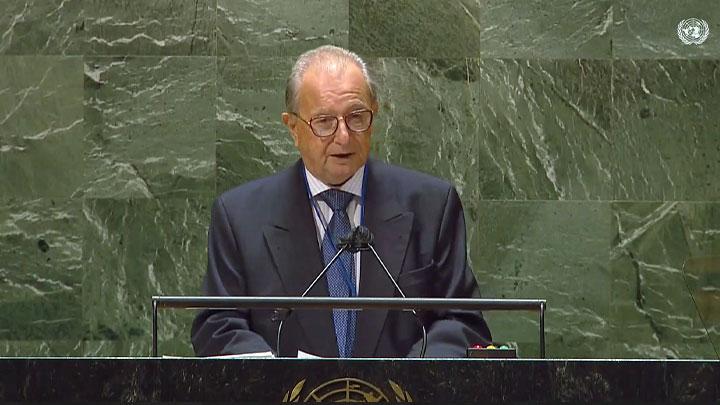President Agius presents Ninth Annual Report to UN General Assembly

The President of the International Residual Mechanism for Criminal Tribunals (Mechanism), Judge Carmel Agius, today presented the Mechanism’s ninth Annual Report to the United Nations General Assembly in New York.
President Agius commenced by congratulating His Excellency Ambassador Abdulla Shahid of the Republic of Maldives on his election as President of the Seventy-Sixth Session of the General Assembly, noting His Excellency’s emphasis on the importance of bringing hope; an aspiration he shares and which in some ways is inseparably linked with the purposes of international criminal justice.
President Agius then provided the General Assembly with an update on judicial developments at both the Arusha and The Hague branches, underscoring that, despite the challenges of the reporting period, the Mechanism made “remarkable headway towards the completion of its core judicial work” without compromising the rights of the accused or the health and safety of participants in the proceedings.
Most notably, this progress included the pronouncement of three landmark judgements in June 2021: the Appeal Judgement in Prosecutor v. Ratko Mladić, and Trial Judgements in the Prosecutor v. Jovica Stanišić and Franko Simatović retrial and the multi-accused contempt case of Prosecutor v. Anselme Nzabonimpa et al. The latter two cases have subsequently moved into the appeals phase and, in accordance with the Mechanism’s Statute, President Agius will preside over the appeal proceedings. In addition, pre-trial preparations have been advancing steadily in Prosecutor v. Félicien Kabuga, including a very productive in-person Status Conference on 6 October 2021.
The President regretted, however, that he was unable to report equivalent progress in the contempt case against Petar Jojić and Vjerica Radeta, recalling that on 11 May 2021 he reported the Republic of Serbia to the Security Council for non-compliance. This is the third time that Serbia has been reported to the Council in relation to the contempt case and follows over six years of inaction on Serbia’s part. President Agius urged Serbia once more to comply with the decisions of the Mechanism and with its international obligations as established by the Security Council itself.
Turning to some of the Mechanism’s other residual functions, President Agius highlighted its active role in supervising the enforcement of sentences imposed by the International Criminal Tribunal for Rwanda, the International Criminal Tribunal for the former Yugoslavia, and the Mechanism. Separately, in relation to the Mechanism’s monitoring of cases referred to national jurisdictions, President Agius noted that advancements have also been made in this area, following the issuance of two appeal judgements in cases referred to Republic of Rwanda.
In closing, the President stated that he was “invigorated by the role that the Mechanism plays […] not only with regard to the conflicts in the former Yugoslavia and Rwanda, but also through our important contributions to the landscape of international criminal justice more generally”. He emphasised, however, that the Mechanism cannot do so alone and will continue to rely on the steadfast support of Member States who believe in its mission. In this regard, President Agius expressed his deepest gratitude to the Mechanism’s Host States and 14 enforcement States, as well as Rwanda and the countries of the former Yugoslavia, and other valued stakeholders. Finally, he acknowledged and praised the valuable assistance provided by the United Nations Legal Counsel and the Office of Legal Affairs.